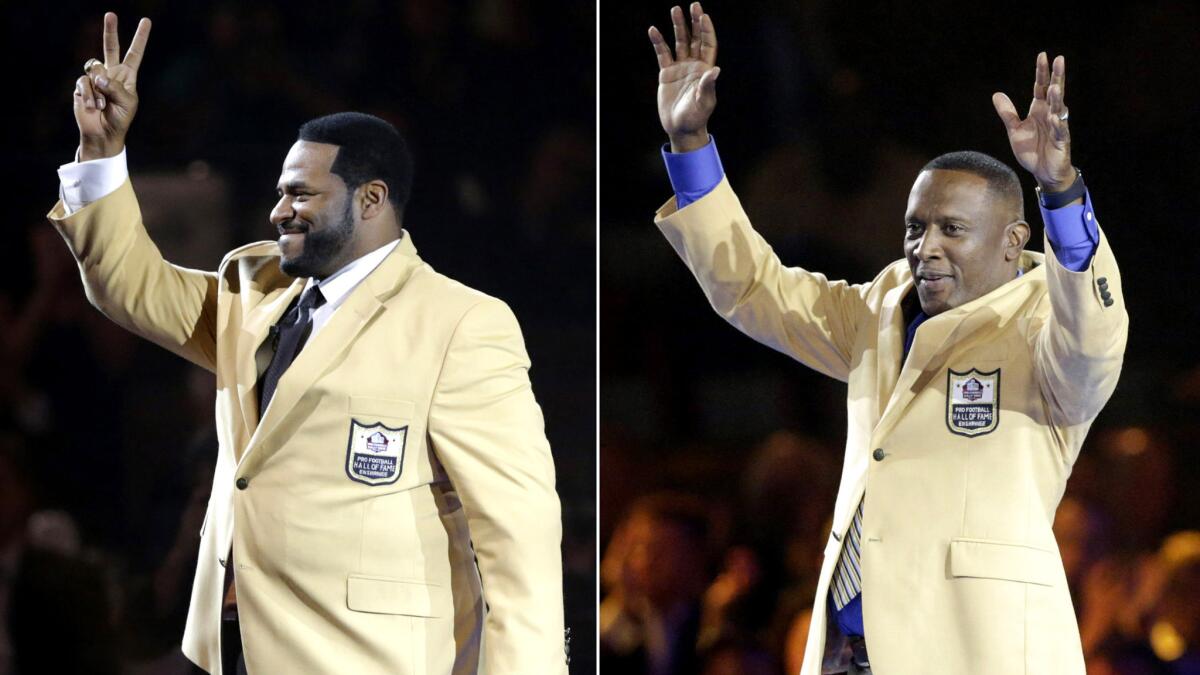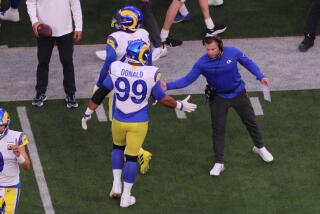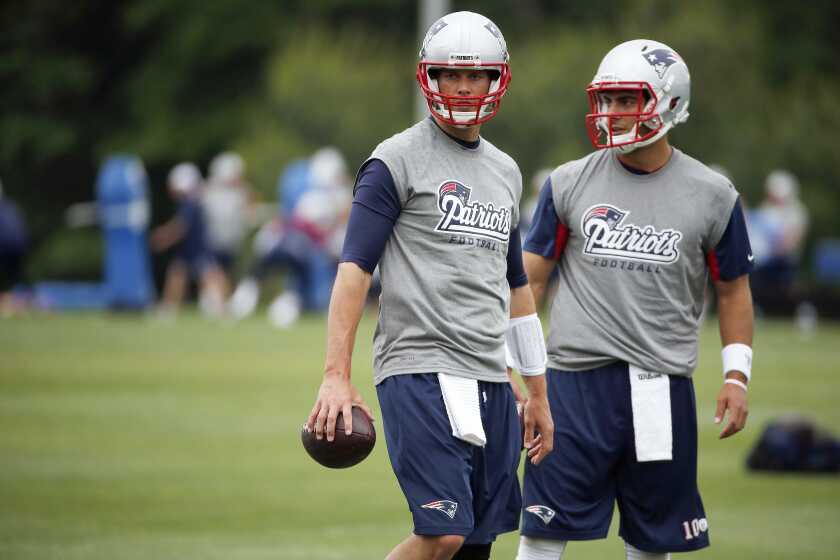Column: Tim Brown and Jerome Bettis ride NFL fame from L.A. to Canton

Running back Jerome Bettis, left, and wide receiver Tim Brown their gold jackets during a Hall of Fame dinner on Friday in Canton, Ohio.
Years before the Los Angeles Rams had The Bus — bruising young running back Jerome Bettis — a heralded L.A. Raiders rookie had The Porsche.
That car belonged to first-year receiver Tim Brown, the No. 6 overall pick in 1988, who rolled into the NFL as the proud owner of a sleek, black Porsche 928. Like Bettis, the No. 10 pick of the Rams five years later, Brown was a standout at Notre Dame.
Back to the car. When a seasoned teammate caught wind of the Porsche, he advised Brown not to bring it to training camp, warning him the veterans wouldn’t take kindly to it because Brown had yet to do anything as a pro.
“I was like, ‘Dude, have you lost your mind? This car was made for L.A.,’” Brown recalled.
But the rookie complied; he left the car in the garage for training camp.
The first time he touched the ball in a regular-season game, Brown returned a kickoff 97 yards for a touchdown against San Diego. In the sideline celebration that followed, that same veteran found Brown on the sideline, telling him, “You can bring that Porsche around here now.”
Almost three decades later, Brown and Bettis will put the finishing flourishes on their illustrious NFL careers. Both will be inducted into the Pro Football Hall of Fame on Saturday, two of the last generation of players who began their careers with L.A. teams.
Unlike Brown, who picked up right where he left off in college, Bettis had to make a dramatic shift when he got to the pros.
“I was a fullback, and then when I came to the Rams, Chuck Knox asked me to play tailback,” said Bettis, who got “The Bus” nickname at Notre Dame but was also known as “The Battering Ram” when he played for the Rams. “In college I was this tough, physical, boom-boom-boom guy, whereas in the NFL, they asked me to be this graceful ballerina. I still had this workman kind of body, but I had to morph into it.”
For both Brown and Bettis, life in South Bend, Ind., and Southern California were as different as George Gipp and the Sunset Strip.
Brown, the 1987 Heisman Trophy winner, lived in Manhattan Beach, but opted not to live directly on the ocean.
“When I went there I was 22 years old,” he said. “They were trying to show me houses, but all I saw were people on the beach, if you know what I mean. People were riding by on skateboards and all this stuff. I was like, ‘No, this would not be a smart move. I think I’d miss a couple practices if I lived down here.’”
Because the Rams played in Anaheim at the time, Brown said the Raiders considered themselves the only true L.A. team. That didn’t mean the Silver & Black always packed the house, though.
“L.A. was great, man, especially when you were playing good football and in the mix,” Brown said. “But I remember that very first time I touched the ball, on that kickoff return. I saw the stands and I’m thinking, ‘Man, it looks like there’s nobody there.’ [The announced attendance for that season-opening game was 39,029.] That stadium at that point sat 105,000, so it looked like ants in the stadium.
“The issue you’re going to have in L.A. is, if you’re not playing the best football, that beach is awfully tempting on Sunday. And God forbid when the Lakers start playing — back in the day they were great — so now people are saving their money to go to those games. We even had to fight with the Dodgers; they were great at that time.”
While Brown’s team was figuratively battling with those clubs for fans, actual fights were commonplace between fans at the Coliseum.
“You couldn’t help but look into the stands,” Brown said. “You’d hear a lot of ruckus going on. Most of the time it wasn’t on our side, it was on the visitor’s side on the corners above the end zone. You’d see everybody swarm and people flying everywhere. That was not the best memories of the fans there, but at the same time the passion that the Raider fans have just goes to another level.
“I actually think by the time we left [after the 1994 season] it had gotten better. I don’t remember having those types of situations in ‘93, ’94.”
Like the Raiders, the Rams often struggled to draw crowds. The franchise that won seven consecutive division titles in the 1970s finished 5-11 and 4-12 during Bettis’ two seasons in Anaheim. He played one season with the St. Louis Rams before being traded to Pittsburgh in 1996 for second- and fourth-round draft picks.
“My perception of L.A? You’ve got to remember, I’m coming from Notre Dame [where] every game is sold out, everywhere we go we’re treated like rock stars, every city we show up in there are thousands of fans there. I get to L.A. and the stadium is half-full, and on the road there’s nobody,” said Bettis, who lived in Anaheim Hills.
“What I realized is there’s two things. One, L.A. is a large city and has a lot of transient people, so people move there from all over the country. But the thing is, the one thing they keep is the love of their football team. So they may have lived in L.A. for 20 years, but they’re still Chicago Bears fans. So the difficult part was not having the same kind of fan support that a lot of the dominant teams have.
“But part of that was also winning. Because the Rams weren’t able to win a championship there, the support doesn’t develop. Because you’re good but not great. In order to develop a generational fan base, you’ve got to win. That’s what you see with the Steelers. You’ve got that generations, and all generations after that are die-hards. You’ve got to develop that somewhere.”
That’s not to say Bettis wasn’t personally successful in his two seasons with the L.A. Rams. The No. 10 pick rushed for 1,429 yards as a rookie, second-best in the NFL, and tied for the league lead with seven 100-yard rushing games even though he didn’t become a full-time starter until Week 6. Named a first-team All-Pro and NFL rookie of the year in his debut season, he followed that by running for 1,025 yards in his second year.
Bettis would go on rush for more than 1,000 yards in eight of his 13 seasons, retiring after the Steelers won the Super Bowl at the end of the 2005 season.
Although he looks back fondly at some Southern California memories, Bettis said there was a starkly different vibe in Pittsburgh, one more befitting his personality.
“Football is just part of the landscape in L.A., whereas in Pittsburgh football is the landscape,” he said. “Mondays if the Steelers lose, it’s bad for workers’ productivity. In L.A., it’s just the beat goes on.”
And as for the L.A. car culture, both Brown and Bettis will take their current mode of transportation any day.
Riding in a Canton parade.
RELATED:
Tim Brown’s top L.A. Raiders memories
Jerome Bettis’ top L.A. Rams memories
Pro Football Hall of Fame: Class of 2015
More to Read
Go beyond the scoreboard
Get the latest on L.A.'s teams in the daily Sports Report newsletter.
You may occasionally receive promotional content from the Los Angeles Times.











